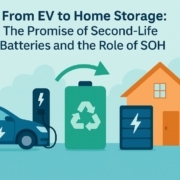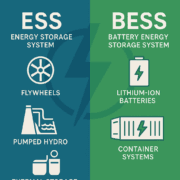CE for BESS: Complete Guide to Battery Energy Storage Certification
Battery Energy Storage Systems (BESS) are critical to the clean energy transition, but ensuring their safety and compliance requires more than just good engineering. Certifications like CE for BESS is one of the most recognized marks in Europe, confirming that a product meets essential health, safety, and environmental standards. However, while CE is necessary for entering the EU market, it does not always guarantee complete system-level safety. To build global trust, manufacturers often combine CE with other certifications such as UL and IEC, ensuring stronger compliance, reliability, and market acceptance.
What Does CE Certification Mean for BESS?
The CE mark (Conformité Européenne) is a mandatory certification for products entering the European Economic Area (EEA). For BESS, CE shows compliance with EU directives and harmonized standards.
When a BESS carries the CE mark, it declares conformity with the following directives:
- Low Voltage Directive (LVD) – Protects against electrical hazards.
- Electromagnetic Compatibility (EMC) Directive – Prevents electrical interference.
- Restriction of Hazardous Substances (RoHS) – Limits toxic chemicals in batteries and components.
- General Safety Directives – Cover risks related to machinery and consumer use.
In essence, CE for BESS confirms that the system has met basic EU safety and environmental requirements, allowing it to be legally marketed and installed in Europe.
What Does CE for BESS Cover?
CE certification for BESS evaluates multiple aspects of product safety. These include:
- Electrical Safety – Preventing risks of electric shock, short circuits, and overheating.
- Thermal Safety – Assessing insulation, cooling design, and fire prevention.
- Electromagnetic Compatibility (EMC) – Ensuring the BESS does not emit disruptive signals.
- Environmental Safety – Controlling hazardous substances and ensuring recyclability.
However, CE certification for BESS is primarily based on a self-declaration of conformity. Manufacturers test the product internally or through a notified body, then issue a Declaration of Conformity (DoC).
This process makes CE less complex compared to third-party certifications like UL or IEC, which require independent validation and rigorous lab testing.
Why Do Most Companies Choose Only CE Certification for BESS?
Many BESS companies stop at CE certification instead of pursuing more demanding approvals. The main reasons include:
- Lower Costs: CE testing is more affordable than UL or full IEC certification, which involve expensive third-party audits.
- Faster Market Entry: CE certification is quicker, often taking weeks instead of months.
- Simpler Process: CE allows self-declaration, reducing reliance on external labs.
- Minimum Requirement: Since CE is mandatory in the EU, many companies view it as the lowest barrier to entry.
In other words, CE is often seen as the easiest, fastest, and cheapest way to access the European market. But relying on CE alone raises important safety concerns.
Is CE Alone Enough for BESS Safety?
The answer is no. While CE for BESS ensures legal entry into the EU market, it does not fully address the complex safety risks of modern energy storage systems.
BESS involves large-scale lithium-ion batteries, which can pose hazards like:
- Thermal Runaway – Fire and explosion risk if cells fail.
- High Voltage Risk – Danger of electric shock during installation or maintenance.
- System-Level Failure – Risks from inverters, converters, or control systems.
To mitigate these risks, global safety standards go far beyond CE. Manufacturers often need UL, IEC, or national certifications depending on their target markets.
Key International Standards Beyond CE for BESS
Here are the most important certifications that complement CE for BESS:
1. IEC Standards (International)
- IEC 62619: Safety requirements for lithium-ion batteries used in stationary storage.
- IEC 62933 series: Covers energy storage integration into power grids.
- IEC 62109: Focuses on safety of power converters.
2. UL Standards (North America)
- UL 9540: Safety requirements for complete BESS systems.
- UL 1973: Safety of battery modules for stationary applications.
- UL 9540A: Test method for thermal runaway fire propagation.
3. National Certifications
- BIS (India): Mandatory for lithium-ion cells and BESS units.
- TISI (Thailand): Battery certification for safety and performance.
- KC (Korea): Compliance for batteries and power systems.
- PSE (Japan): Electrical safety approval.
Together, these standards ensure that a BESS is safe, grid-compatible, and globally marketable.
CE vs UL vs IEC: Key Differences
| Certification | Region | Scope | Testing Requirement | Market Perception |
|---|---|---|---|---|
| CE | Europe | Basic health, safety, EMC | Self-declaration or notified body | Entry-level compliance |
| UL 9540 | USA/Canada | Full system safety | Third-party lab required | High credibility |
| IEC 62619 / 62933 | Global | Battery + system safety | Third-party testing | Widely respected |
| BIS / KC / PSE | National | Country-specific safety laws | Mandatory local tests | Legal requirement |
This table shows why CE is the easiest to achieve but IEC and UL carry higher safety credibility.
Why BESS Needs Multiple Certifications
Unlike small electronics, BESS operates at industrial-scale energy levels, which makes multi-layer certification essential.

- CE ensures compliance in Europe, but it does not evaluate system-level fire safety.
- UL validates complete system safety and is trusted in North America.
- IEC sets a global benchmark, especially for grid integration.
- National standards guarantee local approval, allowing sales in markets like India, Japan, or Korea.
Therefore, CE should be seen as the foundation, while UL, IEC, and national approvals are the reinforcements. Together, they create a safe and credible BESS product.
Why Companies Should Go Beyond CE for BESS
Although CE is attractive for cost and speed, relying on it alone can lead to challenges:
- Limited Market Reach: CE only works in Europe, not globally.
- Lower Buyer Confidence: Utilities and large clients often demand UL or IEC reports.
- Safety Risks: CE’s self-declaration model may overlook thermal runaway or fire propagation risks.
- Regulatory Pressure: More countries are adopting stricter BESS safety laws.
Companies that invest in full certification portfolios gain stronger market access, brand reputation, and customer trust.
Conclusion: CE is Essential but Not the Final Step
CE for BESS is a mandatory starting point for European market access. It ensures compliance with basic safety, EMC, and environmental standards. However, CE is not enough to prove the full safety of complex battery energy storage systems.
Most companies choose CE because it is fast, affordable, and easy, but long-term success requires additional certifications like UL 9540, IEC 62619, and BIS. These provide independent validation, global acceptance, and higher safety assurance.
In the evolving energy landscape, BESS manufacturers and project developers must go beyond CE certification to build trust, reliability, and international growth opportunities.
❓ Frequently Asked Questions About CE for BESS
1. What is CE certification for BESS?
CE certification for Battery Energy Storage Systems (BESS) is a European conformity mark that shows the product meets essential EU safety, health, and environmental requirements. It’s a legal requirement for selling BESS in the European Economic Area (EEA).
2. Does CE certification cover fire safety in BESS?
No. CE certification ensures compliance with core directives but does not specifically address thermal runaway or fire safety risks. For complete system safety, manufacturers often pursue additional certifications like UL 9540A (fire safety) or IEC 62619 (battery cell safety).
3. How is CE different from UL or IEC certification?
CE Certification: Mandatory for the EU market, focuses on regulatory compliance.
UL Certification: Recognized mainly in North America, emphasizes product safety and fire prevention.
IEC Standards: Internationally accepted, providing detailed technical guidelines for testing and performance.
Using CE alone may open EU markets, but UL and IEC certifications build global trust and credibility.
4. Can I sell CE-certified BESS outside Europe?
Not necessarily. While CE certification allows access to EU markets, other regions like the US, Middle East, and Asia-Pacific often require local standards such as UL, BIS, or GB/T. Companies targeting global markets usually combine CE with additional certifications.
5. How long does CE for BESS take?
The timeline depends on the complexity of the BESS and the scope of testing. In general:
Large, complex systems: 3–6 months
Working with an accredited testing lab or certification body can speed up the process.
Simple systems: 4–8 weeks
6. Why is CE certification alone not enough for BESS safety?
Because BESS safety risks go beyond basic compliance. Issues like thermal runaway, grid stability, and fire containment need deeper testing. That’s why CE is often just the starting point, with UL, IEC, and country-specific certifications adding the necessary system-level validation.












Trackbacks & Pingbacks
[…] 👉 Explore more: CE for BESS: Complete Guide […]
[…] why global standards such as UL certifications for battery systems and CE for BESS require strict compliance with safety and thermal management […]
[…] 👉 Related Reading: CE for BESS – Complete Guide to Certification […]
[…] Europe (CE): IEC standards are often harmonized with EN standards for CE marking. […]
[…] Products sold in the European Union must meet CE requirements. For BESS, this includes: […]
Leave a Reply
Want to join the discussion?Feel free to contribute!